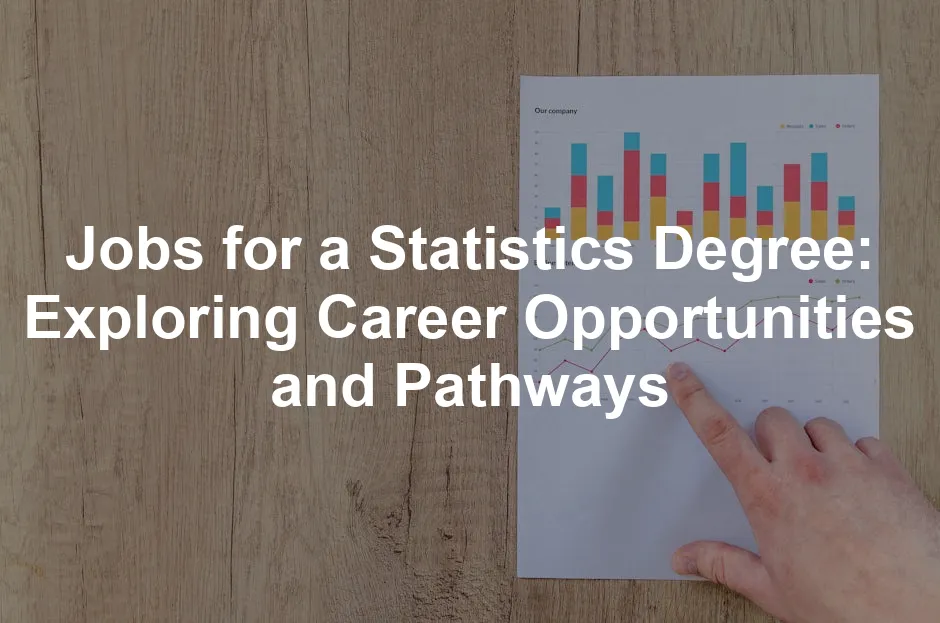Introduction
In our data-driven world, a statistics degree is like gold. Businesses and organizations crave data-savvy professionals. Why? Because statistics empowers them to make informed decisions. From healthcare to finance, and government to technology, statistical skills are essential across sectors.
Imagine a healthcare professional using data to improve patient outcomes. Or a financial analyst predicting market trends with precision. Statisticians help solve real-world problems, drawing meaningful insights from raw data. Their expertise is crucial in understanding consumer behavior, optimizing operations, and even crafting public policy.
This article aims to explore the myriad of job opportunities available to statistics graduates. Whether you’re a fresh graduate or considering a career shift, there’s a role waiting for you. Let’s dive into the various pathways that can lead to a fulfilling career in this exciting field.

The Value of a Statistics Degree
Why Statistics Matter
Statistics plays a pivotal role in decision-making processes. It equips organizations with the ability to analyze trends, forecast outcomes, and understand complex phenomena. Consider public health initiatives that rely on statistical data to formulate policies. These decisions can impact community health and safety.
In economics, statistics helps evaluate the effectiveness of fiscal policies. By analyzing data, economists can gauge the outcomes of government actions. Statistics becomes the backbone of informed policy formulation, guiding leaders towards the most effective solutions.
Real-world issues such as climate change, healthcare accessibility, and economic disparities highlight the power of statistics. Take the COVID-19 pandemic as an example. Data analysis has been instrumental in tracking virus spread and effectiveness of vaccines. Statisticians have played a crucial role in keeping the public informed.
In essence, statistics transforms data into actionable insights. It’s not just about numbers; it’s about making a difference. A statistics degree opens doors to careers that contribute significantly to various fields, making it a valuable asset in today’s job market.

Skills Acquired with a Statistics Degree
A statistics degree is not just about crunching numbers; it equips you with a treasure trove of skills. First and foremost, data analysis reigns supreme. You’ll learn how to interpret data and extract meaningful insights. Problem-solving skills are also honed. You’ll tackle complex issues and develop solutions based on statistical evidence. Critical thinking is another key skill. You’ll evaluate information from various perspectives, ensuring well-rounded decision-making.
Moreover, you’ll become proficient in programming languages and tools that are essential in the field. R and Python will be your trusty sidekicks for data manipulation and analysis. If you’re looking to dive deeper into Python, grab a copy of Python for Data Analysis by Wes McKinney. This book is a must-have to help you harness the power of Python in your data analysis projects!
Familiarity with software like SAS and SPSS will also come in handy. These skills are not just academic; they’re highly sought after in the job market.
For more insights on how to effectively analyze data, check out these tips for effective data analysis in economics and statistics.
Direct Career Paths for Statistics Graduates
Core Statistics Careers
Statistician
Statisticians are the detectives of data. They collect, analyze, and interpret complex data sets. Their job responsibilities include designing surveys and experiments, as well as applying statistical methods to solve real-world problems. Statisticians can be found in various work environments, from government agencies to private companies. The median salary for a statistician hovers around $104,860 per year. Industries that hire statisticians range from healthcare to finance, ensuring a wealth of opportunities.

Data Scientist
Data scientists are the rock stars of the analytics world. They utilize advanced statistical methods to analyze large data sets, turning raw data into actionable insights. Skills required for this role include programming, statistical modeling, and machine learning. The demand for data scientists is skyrocketing across sectors such as technology, healthcare, and finance. With a median salary of around $108,020, this is a lucrative path for statistics graduates.
If you’re interested in practical statistics, consider checking out Practical Statistics for Data Scientists by Peter Bruce. This book offers 50 essential concepts that will make you a better data scientist!
Actuary
Actuaries are the financial wizards who assess risk and uncertainty. They use mathematical and statistical methods to evaluate the likelihood of future events, helping businesses minimize risks. Actuaries typically work in insurance and finance, where their analyses guide critical decisions. A bachelor’s degree in statistics or a related field is essential, and many actuaries pursue further education. The job outlook is bright, with a median salary of $105,900 per year, reflecting the high demand for this expertise.

Biostatistician
Biostatistics is a cornerstone of healthcare and medical research. It applies statistical methodologies to analyze data related to health, biology, and medicine. This discipline is crucial for designing studies, analyzing clinical trials, and interpreting complex health data. Biostatisticians help researchers understand the effectiveness of treatments and interventions, ultimately guiding public health policies.
Typical employers in this field include hospitals, pharmaceutical companies, and government health agencies. They rely on biostatisticians to provide insights that inform healthcare decisions. For example, the Centers for Disease Control and Prevention (CDC) often employs biostatisticians to analyze disease outbreaks and assess health trends. Similarly, pharmaceutical companies depend on these experts to evaluate the safety and efficacy of new drugs before they hit the market. In short, biostatisticians wield their statistical magic to improve health outcomes for all.

Market Research Analyst
Market research analysts play a pivotal role in shaping business strategy. They collect and analyze data about consumers and market conditions. Their insights help firms understand what products or services will resonate with the audience. This role is vital for guiding companies in their marketing efforts and product development.
Understanding consumer behavior is at the heart of this job. Analysts utilize surveys, focus groups, and sales data to gauge what makes customers tick. They identify trends and preferences, allowing businesses to tailor their offerings effectively. In a world where consumer preferences can shift overnight, the insights provided by market research analysts can make or break a company’s success. It’s a thrilling field for those who love data and want to influence business outcomes.

Financial Analyst
Financial analysts are the financial wizards of the corporate world. They assess the performance of investments, stocks, and financial products, guiding businesses and individuals in their financial decisions. Job responsibilities include conducting research, preparing financial reports, and creating models to predict future performance.
These analysts work across various industries, including investment banking, insurance, and corporate finance. They often provide recommendations based on their analyses, helping clients navigate complex financial landscapes. The median salary for financial analysts is quite competitive, and job growth is projected to remain strong as companies increasingly seek to optimize their financial strategies. With the right skills, financial analysts can enjoy a rewarding and dynamic career.

Emerging and Interdisciplinary Roles
Data Analyst
Data analysts are the unsung heroes behind data-driven decisions. Their primary tasks involve collecting, processing, and analyzing data to identify trends and insights. They play a crucial role in various sectors, from marketing to healthcare, by transforming raw data into actionable information.
Data analysts often use tools like SQL, Python, and R to manipulate datasets. They create visualizations to present findings, making complex data easier for stakeholders to understand. Career progression opportunities are abundant in this field. Starting as a data analyst can lead to roles like data scientist or business intelligence analyst, providing a clear trajectory for growth. In today’s data-centric world, skilled data analysts are in high demand, making this a lucrative career choice for statistics graduates.

Operations Research Analyst
Operations Research Analysts are the wizards of problem-solving in organizations. They use advanced mathematical methods to optimize processes and enhance decision-making. Imagine a bustling factory trying to streamline production. An operations research analyst steps in, analyzing data to propose the most efficient workflow. Their work often leads to significant cost savings and improved productivity.
To excel in this role, certain skills are paramount. Proficiency in statistical analysis software like R or Python is essential. Familiarity with optimization techniques and mathematical modeling also plays a critical role. Strong analytical thinking helps these analysts dissect complex problems and propose viable solutions. Communication skills are equally vital, as they must convey technical information to non-technical stakeholders. Ultimately, operations research analysts help organizations make informed decisions that drive success.

Business Analyst
Business Analysts act as the bridge between data and strategy. They sift through mountains of data, identifying patterns and insights that inform business strategy. Their role is crucial in ensuring that data-driven decisions align with organizational goals. Picture a company looking to launch a new product. A business analyst evaluates market data, consumer behavior, and trends to shape the product’s direction.
Statistical knowledge enhances their effectiveness immensely. By applying statistical methods, business analysts can validate assumptions and forecast outcomes with precision. Familiarity with tools like SQL, Excel, and data visualization software is essential. Strong problem-solving and critical thinking skills allow them to interpret data meaningfully. In a world where data reigns supreme, business analysts ensure organizations harness its power to thrive.

Alternative Career Paths
Related Fields Utilizing Statistical Skills
Education
The field of education offers exciting opportunities for statistics graduates. Teaching statistics at various levels can be incredibly rewarding. Whether in high school or university, educators play a vital role in shaping future data-savvy professionals. Statistics is foundational in many disciplines, from social sciences to business, making qualified educators highly sought after.
For high school educators, a bachelor’s degree may suffice. However, teaching at the university level typically requires advanced degrees, such as a master’s or PhD in statistics or a related field. These advanced degrees open doors to research opportunities and higher teaching positions, allowing educators to contribute significantly to the academic community.
Additionally, educators can engage in curriculum development, ensuring students grasp essential statistical concepts. With the rise of online learning, educators can also reach a global audience, making their expertise accessible to all. Thus, a career in education not only allows statistics graduates to share their knowledge but also helps cultivate the next generation of data professionals.

Government Roles
When it comes to government jobs, statistics graduates are highly sought after. Agencies at local, state, and federal levels constantly seek data-oriented professionals. Roles like data analysts and policy advisors are just a few examples where your statistical skills can shine.
Data analysts in government roles play a critical part in shaping policies. They gather and analyze data to inform decision-makers. Imagine being the one providing insights that help allocate resources effectively in your community. That’s the kind of impact statisticians can make!
Policy advisors, on the other hand, use statistics to evaluate the effectiveness of existing policies. They rely on data to recommend changes that can improve public welfare. Whether it’s healthcare, education, or environmental policies, statistics are crucial in assessing outcomes and guiding future actions.
Statistics also plays a significant role in public health initiatives. For instance, during health crises, statisticians analyze the spread of diseases. They help design interventions and track their effectiveness. The COVID-19 pandemic showcased how statistical analysis is vital in managing public health. The data-driven decisions made by governments during this time were often rooted in statistical expertise.
Furthermore, the significance of statistics extends to economic planning. Government economists rely on statistical data to forecast economic trends. They analyze variables like employment rates, inflation, and GDP growth. These statistics guide fiscal policies that affect the entire nation.
Statisticians also find opportunities in agencies like the Census Bureau or the Bureau of Labor Statistics. These organizations rely on accurate data collection and analysis to inform the public and policymakers.
In summary, government roles for statistics graduates are abundant and impactful. Whether working as data analysts or policy advisors, your skills can directly influence public policy. The significance of statistical analysis in governance cannot be overstated. It’s about making informed decisions that can improve lives, one data point at a time.

Further Study and Specialization
Advancing Your Career with Additional Education
If you’re serious about maximizing your career potential, consider further studies. Pursuing a Master’s or PhD in statistics or related fields can open doors to advanced positions. A graduate degree not only deepens your knowledge but can also enhance your job prospects significantly.
Specializations like data analytics, biostatistics, or actuarial science are particularly popular. Data analytics focuses on extracting insights from big data, making it highly relevant in today’s tech-driven world. Biostatistics combines life sciences and statistics, offering exciting opportunities in healthcare research. Actuarial science, on the other hand, prepares you for risk assessment roles, particularly in insurance.
Many employers prefer candidates with advanced degrees. They view them as more competent and knowledgeable. Plus, specialized courses often provide hands-on experience with real-world data, which is invaluable.
Investing in further education is a strategic move for long-term career growth. It not only boosts your credibility but can also increase your earning potential. If you’re looking for a comprehensive guide on the subject, check out Statistics for Data Science by James D. Miller. This book provides a solid foundation for anyone looking to delve deeper into the world of data science!

Professional Certifications
Certifications can also enhance your career prospects. Relevant certifications like the Certified Analytics Professional (CAP) or SAS certifications can set you apart. These credentials demonstrate your commitment to professional development and mastery of statistical tools.
Professional certifications often require passing exams and demonstrating experience in the field. They can significantly enhance your resume and appeal to potential employers. Many organizations value certified professionals for their expertise and dedication.
Moreover, certification programs often provide networking opportunities. Connecting with other professionals can lead to job offers or collaborations down the line.
In conclusion, further study and professional certifications are excellent ways to advance your career. They open up new opportunities and provide a competitive edge in the job market. Investing in your education and credentials is a smart strategy for any statistics graduate.

Conclusion
In the realm of statistics, diverse career opportunities await graduates. From government roles to private sector positions, the options are plentiful. As we’ve explored, statisticians can influence public policy, enhance business strategies, and drive innovation.
It’s essential to explore your interests and develop relevant skills to thrive in your chosen field. Whether you lean towards data analysis, biostatistics, or actuarial science, there’s a path for you.
The demand for statisticians is growing rapidly. Organizations across industries need data-savvy professionals to make informed decisions. Networking and gaining practical experience through internships can significantly boost your career prospects. And for those looking to further their knowledge, consider reading Naked Statistics: Stripping the Dread from the Data by Charles Wheelan. It’s a fun and engaging read that simplifies complex statistical concepts!
So, embrace your statistics degree! It’s more than just a piece of paper; it’s your ticket to making a meaningful impact in various sectors.
FAQs
What industries hire statistics graduates?
Statistics graduates find opportunities across various industries. Finance is a major player, seeking analysts who can interpret market data. Healthcare also values statisticians for their expertise in biostatistics and public health. Government agencies, of course, are notable employers, utilizing statistical analysis for policy-making. Technology companies often hire data scientists and analysts to help make sense of user data. Market research firms also seek statisticians to understand consumer behavior and trends. Lastly, educational institutions employ statistics graduates for teaching and research roles.
What is the job outlook for statistics graduates?
The job outlook for statistics graduates is promising, with a projected growth rate of 31% from 2021 to 2031. This growth is significantly higher than the average for all occupations. As businesses and organizations increasingly rely on data-driven decision-making, the demand for statisticians continues to rise.
Do I need a Master’s degree to work in statistics?
While many entry-level positions in statistics require only a bachelor’s degree, a Master’s degree can enhance your opportunities. Advanced roles, particularly in specialized fields like biostatistics or actuarial science, often require a graduate degree.
How can I gain practical experience while studying?
Internships, part-time jobs, and volunteer opportunities are excellent ways to gain practical experience. Many universities offer career services to help students find internships related to their studies. Networking with professionals in the field can also lead to valuable opportunities.
What skills should I focus on developing?
Key skills for statistics graduates include proficiency in programming languages like R and Python. Data visualization skills are also essential for presenting findings effectively. Additionally, critical thinking and problem-solving abilities are crucial in interpreting data and drawing actionable insights.
Please let us know what you think about our content by leaving a comment down below!
Thank you for reading till here 🙂
All images from Pexels




